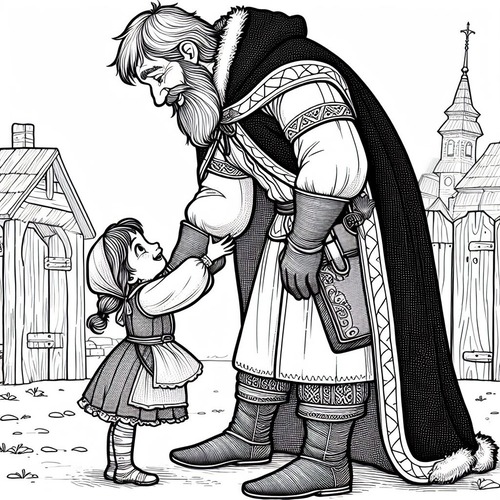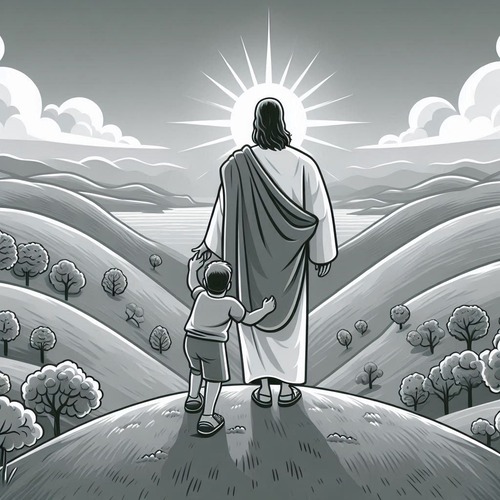The Cost of Discipleship: Lessons from Luke 14
The Slave Girl's Choice—An Allegory on Discipleship
In days gone by, slave markets were grim scenes of profound despair and hopelessness for those enslaved. Amidst the jostling crowd at one such auction, a young girl stood, her eyes brimming with dread as she faced the prospect of a life of hardship under a cruel master's demand. Two notorious men, both infamous for their ruthlessness, engaged in a fierce bidding war, battling to claim her as the owned. With each escalating bid, the young girl's heart sank deeper into despair, her future looking bleaker with every call.
Just as it seemed her fate was sealed, a third man entered the fray. His presence was commanding yet compassionate. He outbid the others, and the gavel fell in his favor. The young girl, now his possession, braced herself for what was to come. But then, the unexpected happened. The man approached her and said, "Little girl, you've been a slave all your life, but I set you free."
Dazed by his words, she stood in disbelief. Freedom was a concept she had never dared to dream of. But as she pondered her newfound liberty, she realized she had nowhere to go, no one to care for her. With a heart full of gratitude and hope, she approached her redeemer and said, "There's no one to look out for me in this world. I'd gladly be your servant for life."
This story reflects the relationship we can have with Jesus Christ. He finds us enslaved to sin, despair, and hopelessness, but pays the ultimate price to redeem us into glorious freedom. This gift of salvation then awakens within us a longing to wholeheartedly follow and serve our Deliverer, not out of obligation, but out of overwhelming love and devotion. We decide to follow Him having counted the cost of discipleship. Such is the essence of true discipleship.
The Cost of Discipleship: Its Supreme Demands
But what does this costly commitment to Christ truly require of us? In Luke 14:25-33, Jesus lays bare the extraordinary demands of being His disciple. With sobering clarity, He outlines what's expected:
- Loving Christ More Than Personal Relationships (vs. 26) Jesus said, "If anyone comes to me and does not hate his father and mother, wife and children, brothers and sisters—yes, even their own life—such a person cannot be my disciple." The word "hate" here is not literal but a hyperbolic expression to illustrate that our love for Christ should surpass all other affections. Our devotion to Him should be so profound that it makes our other relationships seem secondary in comparison.
- Loving Christ More Than Personal Life Goals and Ambitions (vs. 27) "And whoever does not carry their cross and follow me cannot be my disciple." To carry one's cross means to embrace a life of sacrifice and surrender. It calls for a willingness to forsake personal ambitions and goals if they conflict with the path Christ lays out for us. This is not a call to abandon dreams but to align them with His will and purpose.
- Loving Christ More Than All Personal Possessions (vs. 33) "In the same way, those of you who do not give up everything you have cannot be my disciples." This command is a call to hold our material possessions loosely. We must be ready to part with anything that hinders our full commitment to Christ. True discipleship means prioritizing spiritual wealth over earthly treasures.
Jesus Himself reminds us of the importance of counting the cost with two vivid illustrations. He speaks of a man building a house who first sits down to estimate the cost to ensure he has enough to complete it. Similarly, He describes a king going to battle who first considers whether he can win with his current army. These parables emphasize that thoughtful consideration and commitment are essential in the journey of discipleship. Christ made it clear that following Him would require a serious and deliberate decision, knowing fully what lies ahead.
The Rewards of Discipleship
While the cost of discipleship may seem daunting, the rewards far outweigh the sacrifices. In Christ, we find eternal life, abundant joy, and a purpose that transcends the temporal. By surrendering our lives to Him, we gain far more than we could ever lose.
As the slave girl in the allegory realized, true freedom is found in willing servitude to the One who has set us free. Though the world may scoff at the idea of relinquishing personal ambitions and possessions, those who have experienced the depth of Christ's love understand that there is no greater joy than being His disciple.
So, let us heed the call, embracing the cost of discipleship with open arms, for in doing so, we gain an inheritance that no earthly possession can match-the eternal love and presence of our Saviour, Jesus Christ.
Related Reads:
Editor's Pick

Christian Obedience: God’s Empowerment or an Act of Our Will?
Every Christian knows the struggle. You’re fighting a besetting sin—again. You’ve resolved to do better—again. And you’re wondering: Should I [...]

The Throne-Room Vision: Who Did Isaiah See?
The scene is unforgettable: Isaiah stands in the temple, and suddenly the veil between heaven and earth tears open. He [...]

The Angel of the Lord: Can We Be Certain It Was Christ All Along?
Throughout the Old Testament, a mysterious figure appears: the Angel of the LORD. He speaks as God, bears God’s name, [...]
SUPPORT US:
Feel the Holy Spirit's gentle nudge to partner with us?
Donate Online:
Account Name: TRUTHS TO DIE FOR FOUNDATION
Account Number: 10243565459
Bank IFSC: IDFB0043391
Bank Name: IDFC FIRST BANK






